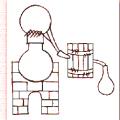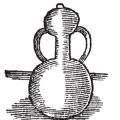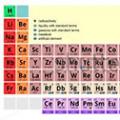One of the most frequently repeated and well-known verses of the Final Revelation of the Almighty is "Ayatul-Kursi" (or the verse "al-Kursi" - "Ayat of the Throne"). It is given in the second sura of the Book of Allah - "Al-Baqarah" ("The Cow") at number 255.
From Abu Hurairah (r.a.) it is transmitted that the Messenger of the Lord Muhammad (s.g.v.) admonished his ummah: “Verily, everything has a peak, and Surah Bakara is the peak of the Koran. And in this sura there is an ayat, which is the master of all the verses of the Koran - Ayatul-Kursi ”(transmitted in the collections of Hakim and at-Tirmizi).
On the Arabic text "Ayat of the Throne" looks like that:
اللّهُ لاَ إِلَهَ إِلاَّ هُوَ الْحَيُّ الْقَيُّومُ لاَ تَأْخُذُهُ سِنَةٌ وَلاَ نَوْمٌ لَّهُ مَا فِي السَّمَاوَاتِ وَمَا فِي الأَرْضِ مَن ذَا الَّذِي يَشْفَعُ عِنْدَهُ إِلاَّ بِإِذْنِهِ يَعْلَمُ مَا بَيْنَ أَيْدِيهِمْ وَمَا خَلْفَهُمْ وَلاَ يُحِيطُونَ بِشَيْءٍ مِّنْ عِلْمِهِ إِلاَّ بِمَا شَاء وَسِعَ كُرْسِيُّهُ السَّمَاوَاتِ وَالأَرْضَ وَلاَ يَؤُودُهُ حِفْظُهُمَا وَهُوَ الْعَلِيُّ الْعَظِيمُ
Transcription: Allah la ilaha illahu, al-khayyul-qayyum. La ta-huzuhu sina-tuu-wa la naum. Lahu ma fis-samawati wa ma fil-ard. Manzallazi yashfa-u ‘indahu illa bi-iznih? Ya'lamu ma bayna aidihim wa ma halfahum. Wa la yu-hituna bi-shayim-min ‘il-mihi illa bima sha! Wa-si-’a Kursiyyuhus-Samaua-ti wal-ard; wa la ya-udu-hu hifzu-huma wa Huual-'aliyyul-'azyim.
Meaning translation: Allah - there is no deity but Him, and only Him we should worship. Allah is Living, Existing and keeps the existence of all people. Neither drowsiness nor sleep embraces him; He alone owns what is in heaven and on earth; and He has no equal. Who will intercede for another before Him without His permission? Allah - glory to Him Almighty! - knows everything that was and what will be. No one can comprehend anything from His wisdom and knowledge, except what He permits. The throne of Allah, His knowledge and His power is vaster than the heavens and the earth, and His protection of them does not burden. Verily, He is the Most High, the One and the Great!
The significance and greatness of this verse is devoted to many hadiths. Some of them are reliable, but there are also weak ones (in other words, there is a loss or doubtful transmitters in the chain of transmitters).
For example, it is narrated that if a believer says the ayat “al-Kursi” to himself after completing obligatory prayers before pronouncing the tasbih (33 times each “SubhanAllah”, “Alhamdulillah” and “Allahu Akbar!”), then nothing will prevent him from entering Paradise after death.
It is also known that the fourth righteous caliph Ali (r.a.) said: “I do not understand those who, going to bed, do not read the “Ayat of the Throne”. According to him, if a person were aware of the degree of greatness of this verse, he would never neglect reading it, because this fragment of the Noble Quran was sent down to the Final Messenger of God (s.g.v.) from Arsh itself.
It is believed that reading "Ayat al-Kursi" helps to overcome the devil and rid his home of him. You can learn this dua by repeating after the Quran hafiz in our video, which also contains a transcription in Russian letters:
No one has doubts and disagreements about the importance of constantly quoting Ayatul-Kursi. The reason is simple: here the highest qualities inherent only to Him are very often mentioned: Hayu (Eternally living, He who has neither beginning nor end); Qayum (Existing, Independent of anyone and nothing, not needing anyone or anything); Aliyu (the Highest, Most Honored); Azimu (The Greatest).
In addition, in the verse "al-Kursi" there are such signs of the Creator as:
- Wahdaniyat (Unity): "Allah - there is no deity but Him ...";
- Gyilm (Possession of knowledge): “... knows everything that was and what will be. No one can comprehend anything from His wisdom and knowledge, except what He permits”;
- Malik (dominion): “He alone owns what is in heaven and on earth; and there is no equal to Him…”;
- Kudrat (Power): "The Throne of Allah, His knowledge and His power is vaster than the heavens and the earth, and their protection does not burden Him";
- Irada (Will): “Neither drowsiness nor sleep embraces Him”, “no one can comprehend anything from His wisdom and knowledge, except what He permits” (2:255).
This passage from Surah Bakara has such a name because of the word Kursi mentioned in it. Theologians gave him different interpretations. Hasan Basri believed that Arsh (Throne) of the Lord of the worlds is meant here. Ibn Kathir, on the other hand, assured that “Kursi” does not simply mean Arsh, but it is something more than a throne. Abdullah ibn Abbas (r.a.), in turn, emphasized: “Kursi” means gylm (knowledge) of our Creator.
Question: Assalamu alaikum wa rahmatullahi wa barakatuh!
A non-Muslim woman asked me how and why we pray in a language we don't understand. She also asked how we can pray to God and not know exactly what we are saying to Him.
There is a certain meaning in her words, since most of us young Muslims do not know true value what we read, and what task it carries in the life of a Muslim. We are taught to read, and we just keep reading because we were told to do so.
I know a lot of the suras Ya-sin, Vakia and Rahman, but I do not know the meaning of these suras. Why does it happen that we do not know the meaning of most of the suras we read?
Will we be punished for not knowing their meaning?
It was embarrassing for me to say that I was reading something that I did not understand the meaning of. So, she asked me what I'm reading now. At that moment it was the sura "Ya-sin", but I do not know its translation. We pray regularly, but the only thing I'm sure of in prayer is intention. Is there really nothing in our prayer but intention?
Please reply as soon as possible.
Answer:
In the name of the Gracious and Merciful Allah!
Assalamu alaikum wa rahmatullahi wa barakatuh!
First, we would like to remind you that the Holy Quran is the Speech of Allah. It will remain as it is, and reading or writing it in any other language will not count as the Qur'an. It can be called a translation or transliteration of the Qur'an, but it cannot be called the Qur'an.
And Allah knows best.
Wassalam.
Mufti Suhail Tarmahomed
Tested and Approved by: Mufti Ibrahim Desai
Department of Fatwas of the Council of Alims (KwaZulu-Natal, South Africa)
Assalamu Alaikum!
I heard the opinion that it is not allowed for a woman to read suras and ayahs from memory during the Haida period. Is there a Dalil confirming or denying this?
Wa alaikum assalam wa rahmatullah.
There is quite a lot of material on this topic, but I will try to present it in a concise but understandable way.
There is ikhtilaf in this issue since the time of the first imams.
I think we do not need to consider all 3 sides, because it will take a lot of space and time, but we will limit ourselves to only the first two, i.e. we will pay attention to the arguments of the side that prohibited, and to the arguments of the side that allowed (i.e. 1 and 2 sides).
1. The opinion of the majority of scholars of the Ummah that women during the periods of haid and nifas are forbidden to read the Qur'an. Arguing their opinion on this issue, the first side cited many hadiths, but we will limit ourselves to a few of them:
a) ‘Umar ibn al-Khattab said: “A person in a state of defilement (junub) does not read the Koran!”
Ibn Abi Shayba 1/97.
Hafiz Ibn Hajar confirmed the authenticity of the isnad. See "at-Talkhys" 1/1
b) ‘Ali ibn Abi Talib said: “Read the Qur’an until one of you is junub, and if someone is in a state of janaba, then let him not even read one letter!”
‘Abdur-Razzaq 1306, al-Bayhaqi 1/98. Imam ad-Darakutni confirmed the authenticity.
c) He ('Ali), may Allah be pleased with him, also said:
“I saw the Messenger of Allah, peace and blessings of Allah be upon him, perform ablution and read something from the Qur'an, after which he said:
“This is for those who are not defiled. The one who is in great defilement cannot read even one verse.
This hadith was narrated by Ahmad 1/110 and Abu Ya'la and the text belongs to the latter.
The unanimous opinion of the ummah is that a woman in the period of haid or nifaas is junub (i.e., in a state of great defilement).
All actions forbidden to a person who is in a state of defilement after intercourse or sleep with ejaculation are also forbidden to women in these two states, since they are considered as a great defilement.
Thus, it is clear that the first side considers the position of a woman during these periods as a junub, and she enters under the prohibition, which is indicated in the above hadith.
2. I would like to add that the first side in this matter cited several hadiths, which indicated that it was forbidden for women to read the Qur'an during such periods, but they are all weak.
a) “A woman who has her period and who has postpartum hemorrhage does not read anything from the Qur'an.” ad-Darakutni 2/87.
This hadeeth is also weak because Muhammad ibn Fadl is in its isnad.
Imam Ahmad said: "Hadith of him, the hadith of liars!" See "al-Kamil" 6/161.
This hadeeth is also weak, because in its isnaad Muhammad ibn Fadl, also in this isnad is his father Fadl ibn ‘Atiyah, who is also a weak transmitter, although there were disagreements regarding him.
See "al-Kamil" 6/161, "al-Jarh wa-tta'dil" 8/56, "Tahdhib at-tahdhib" 11/161.
b) Ibn Umara narrates that the Prophet (peace and blessings of Allaah be upon him) said: “A woman during her period and one who is in a state of janaabah should not read anything from the Qur'an”
(Narrated at-Tirmidhi 131, Ibn Maajah 595, Daaragutni 1:117, Al Bayhaqi 1:89.)
This is a weak hadeeth because it was narrated through Isail ibn Ayyash of Hijaz and his reports are known as weak among hadith scholars.
Sheikh ul-Islam ibn Taymiyyah (21:460): "This is a weak hadeeth, according to the unanimous opinion of the scholars of hadith."
Nasb al Rayyah 1:195, al Tallis al Khabir 1:183)
Based on the foregoing, the second side argued in favor of the fact that a person who is in sexual defilement, and also a woman in the period of haid or nifaas, are junub, but they differ in position.
It is based on the admissibility of reading the Qur'an to women during these periods, I ask you to emphasize that it is for women during these periods (!), Until there is evidence to the contrary.
There is no evidence that a woman should not read the Qur'an during her period, as detailed in:
1) http://fatwaonline.net/?view=question&id=2564
2) Also Sheikh al-Albani, speaking on this subject, stated:
"The position of a woman who has haid or nifas cannot be equated with the position of a man in great defilement, since the janib, i.e., who is in great defilement, is in a state of purification. He can be purified in order to read the Qur'an or touch it if he is capable, and it is better for him to do so.
However, a woman in the state of haida or nifaas, she cannot purify herself...
And how can one say, while showing favor to such a woman, that she refrain from reading the Qur'an, both from memory and from the Mushaf itself"
This opinion was supported by such scholars as Imam Malik, ash-Shaukani, Ibn Taymiyyah, and this is also one of the opinions of Imam Ahmad. Of modern scholars, this is the opinion of the Standing Committee, as well as Sheikh al-Albani.
3. Also, according to the opinion of the majority of the scholars of the Ummah, it is forbidden to touch the Qur'an, both without small and large ablution, and this is the opinion:
Abu Hanifa, Malik, ash-Shafi'i and Ahmad, and this opinion was chosen by Shaykhul-Islam Ibn Taymiyyah.
See “al-Bahru-rraik” 1/211, “Mawahib al-jalil” 1/303, “al-Khawi al-kabir” 1/143, “al-Kafi” 1/48, “Majmuul-fataawa” 21 /266.
This opinion was also shared by the scholars of the Standing Committee, al-Uthaymeen and Sayyid Sabik.
4. Since a woman, although it is allowed, according to the second side, to read the Qur'an during haid or nifaas, it is still forbidden for her to touch the Qur'an, due to the fact that she is a junub.
As for the question: “Is it possible to touch or transfer the Koran through the cover”, then there is also a well-known disagreement regarding this. Most scholars forbade this if the cover is part of the Qur'an to which the pages are sewn. However, if we say the Koran is in a separate bag or a special box, then there is no problem to touch it.
See "Fataawa Ibn Baz" 10/149.
I would like to emphasize that there were scholars who allowed touching the Qur'an through the cover (i.e. through the cover of the Qur'an itself), without ablution. Among them was Abu Hanifa, but even he said:
“You must not touch the places where the verses are written.” See "Sharkhu-Ssunna" 2/48.
Finally.
The way out in such a situation for her, in shaa Allah, would be to buy a good thick cover for the Qur'an or something that could replace it, such as a stand for the Qur'an.
Ibn Baaz said:
If a person touches or transfers the Qur'an wrapped up, for example in a newspaper, then this is permissible. But it is not allowed to touch the Qur'an directly unless the person is in a state of purity (tahir).
Fataawa al-Shaykh Ibn Baaz (may Allah have mercy on him), 10/150
Ibn Baz also advised using gloves or something else in this case:
Sheikh Salih al Fawzan said:
"The Mus-haf must not be touched, except for those who are in a state of ablution, as it is said in the hadith:" You must not touch the Qur'an without being cleansed ""
Since it is not necessary to have ablution when reading the Qur'an from a mobile, then this makes it easier for a woman during monthly periods ... "
This is all that I could find and summarize in the shortest form, as far as Allah allowed me.
Allah knows best and He is the source of strength.
There are no related posts.
As we know, Ayatul Kursi is one of the most frequently repeated and well-known verses of the Revelation of the Almighty. is considered the master of all verses and the greatest verse of the Qur'an.
It has a deep divine meaning, reflecting on the meaning and comprehending the meaning of which, a person can step far ahead in his spiritual improvement.
The significance and greatness of this verse is devoted to many hadiths of the Prophet ﷺ. They testify to the benefits and virtues, and there is no doubt that reading this verse in different life situations will bring great benefits to a person.
One of the main advantages is that the one who reads it before going to bed will be under the protection of Allah, and the shaitan will not be able to approach him until the morning. The well-known companion of the Prophet ﷺ Abu Hurairah (may Allah be pleased with him) revealed the secret of reading Ayatul al-Kursi before going to bed by the shaitan himself.

In a hadith narrated from Abu Hurayrah (may Allah be pleased with him), it is reported that the Messenger of Allah instructed him to keep the zakat collected in Ramadan, and a man came to him, who began to pick up handfuls of food for himself. Abu Hurairah seized him and said:
« ". He said: " Truly, I am in need, I have many children, and I am in dire need!»
Abu Hurairah let him go, and in the morning the Messenger of Allah ﷺ asked him: O Abu Hurairah, what did your prisoner do yesterday? " He replied: " O Messenger of Allahﷺ, he complained about the need and that he had many children, and I took pity on him and let him go". The Prophet ﷺ said: ».
Abu Hurairah further said: Thus, I knew in advance that he would return, since the Messenger of Allahﷺ spoke: "Indeed, he will return", - and I began to wait for him. After a while, he really came again and began to collect handfuls of food for himself, and I grabbed him and said: " Verily, I will take you to the Messenger of Allahﷺ ! " He said: " Let me go, truly, I am in need, and I have (many) children, and I will not return!"
And I took pity on him and let him go, and in the morning the Messenger of Allah ﷺ asked me: " O Abu Hurairah, what did your prisoner do? " I answered: " O Messenger of Allah, he complained about the need and the fact that he had many children, and I took pity on him and let him go". On this the Prophet ﷺ said: " Verily, he lied to you, and he will return ".
And I began to wait for his third coming, and when he really came and again began to collect handfuls of food for himself, I grabbed him and said: " Verily, I will take you to the Messenger of Allahﷺ, because for the third time you say that you will not return, and then you return again!"
Then he said: " Let me go, and in return I will teach you words that Allah will make useful for you!" I asked: " What are these words? " He said: " When you go to bed, read Ayatul Kursi from beginning to end, and if you start doing this, you will always have a guardian from Allah, and the shaitan will not be able to approach you until morning! " and I let him go.
And in the morning the Messenger of Allah ﷺ asked me: What did your prisoner do yesterday? " I answered: " O Messenger of Allahﷺ he said that he would teach me such words that Allah would make useful for me, and I let him go". The Prophet ﷺ asked: " What are these words? " I answered: " He told me: "When you go to bed, read Ayatul Kursi from beginning to end. ". And he also said to me: " With you there will always be a guardian from Allah, and the shaitan will not be able to approach you until the morning! "
After listening to me, the Prophet ﷺ said: He really told you the truth, despite the fact that he is a notorious liar! Do you know who spoke to you these three nights, O Abu Hurairah? " I said: " Not". The Prophet ﷺ said: " It was the devil "». ( Bukhari, 2311)

No one doubts the importance of the constant. The reason is simple: in addition to what is the most valuable verse of the Qur'an, the names of Allah Almighty and the highest qualities inherent only in Him are very often mentioned here. It contains a description of the all-encompassing greatness and infinity of the qualities of Allah Almighty.




